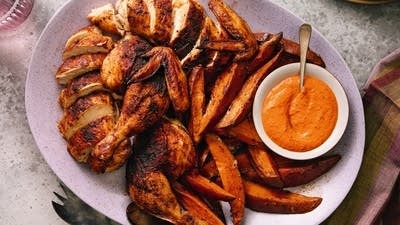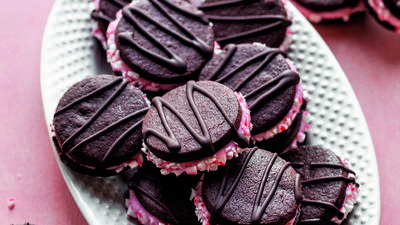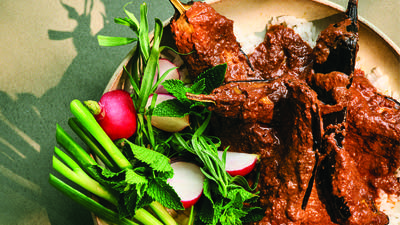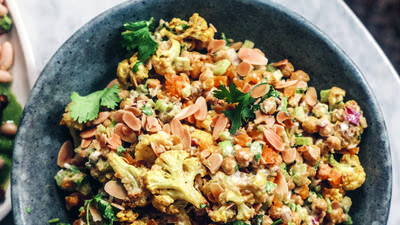
Almost anyone we talk to in the food world, if they know Mike Solomonov, they love Mike Solomonov; he's that kind of energetic guy who could be the mayor of any town he lives in. Solomonov is the chef at Zahav and other restaurants in Philadelphia, he’s got a new book called Israeli Soul, and he was also one of our favorite guests on The Splendid Table this year from our live "The Philly Special" episode. So, Francis Lam invited him back onto the show and into the studio. In this interview, they discuss Solomonov's deep personal interest in Israeli food. They also share a couple of their personal disaster stories. After the interview, Solomonov joined Francis to answer wonderful calls from listeners; you can listen to the the call-in segment here. Treat yourself and make Zahav's popular Tehina Shakes!
Francis Lam: I am really excited about your book Israeli Soul. And for one specific reason: the tehina shake. I'm obsessed with your tehina shake!
Michael Solomonov: I appreciate that. We are very proud of the tehina shake. I feel like the tehina shake is the fuel that is carrying our restaurant group right now. [laughs] It's so good and it’s simple. You can make it with a blender at your house.
FL: For folks who have never had a tehina shake, is it original to you?
MS: It is original to us. We opened Goldie Falafel, which is our falafel shop, we wanted it to be vegan without really calling it like vegan. So, we had these tehina milkshakes that are made with almond milk and tehina and sugar. And they're awesome. We put them in Israeli Soul, which is our new-ish cookbook and you can now make it in the comfort of your own home.
We're really excited about the book. Our restaurant Zahav was such a huge project, taking all of these histories – my personal history and my family's history – and all the different cuisines, and synthesizing them with Zahav being this sort of conduit. We took the whole team that worked on it and flew them to Israel where we shot film and ate for eight days. We had like 82 meals and then came back from that to put together the book Zahav based on like our experience. It’s different, fun and vibrant.
You know that naming books is not the easiest thing to do sometimes.
FL: Sometimes it’s incredibly painful.
MS: Exactly, So, for Zahav it made sense; we had a restaurant and that was the way that we introduced everybody to what it was that we were doing. With Israeli Soul we didn’t want to call it like Israeli Street Food, you know? And we kept referring to the sort of soul of dining that we were doing. How do we put vocabulary to the marketplace, to the standing in kiosks at two o'clock in the morning, to the tiny little restaurants that serve one thing to the tables, to the places where tables were littered with 10 different salatim? What do we call that? The phrase “Israeli soul” came up not as a title for the book, but to the method in which we were traveling through the country and eating. Then it just sort of stuck.
FL: Where do you find the most soul when you're eating in Israel?
MS: I think that it's hard to not find the most soul in people's homes. I think that when you eat in somebody's home, you realize that every person that makes up that household is from somewhere else essentially. And with them they brought their food from the diaspora or the food from the land, and the way that it all comes together at this intersection on a table – as cliché as that sounds – that's the way that it happens. So, I feel like the most soul is in the house.
But you see it in so many different ways, so many different varieties everywhere that you go. You cannot help but run into a plethora of cultures on the street, in bus stops, in restaurants, on the side of the road, driving in the north in The Galilee and just having these people making mountain bread over a fire. You just can't help but run into it. But, I do think that the best way to experience Israeli soul is in somebody's home.
FL: How'd you get into people's homes?
MS: It’s surprisingly easy to do in Israel. [laughs] I think you could just knock on somebody's door before Shabbat and they'll bring you in. I do have a lot of family there, but people in general are open and welcoming; hospitality in the truest form exists over there. Why don't you come with us some time? You would love it! You could come to my dad's house on Saturday afternoon and it's Bulgarian, Romanian, Persian, Arabic. It’s everything. There's nothing like that. There's nothing like seeing the way certain individuals and family members or people that are at the table cling on to these things that are multigenerational and that represent who they are. The way that they cook, the way that they handle the eggplant over the charcoal and gently peel the skin and mince up the flesh with just the right amount of garlic and salt to represent Romanian Jewry. There's no way to describe that. So, I think you'd have to come with me.
 Israeli Soul
by Michael Solomonov & Steven Cook
Israeli Soul
by Michael Solomonov & Steven Cook
FL: I'd love to see that. That's incredible. Well, thank you for the invitation.
So, this is totally different. And maybe it's just a morbid curiosity, but I have been collecting disaster stories from some of the people I interview.
MS: I have so many of them. You know what the problem is? A lot of disasters are like things that you like try to block out and forget. Oh no, I know one! You ready?
FL: I'm ready.
MS: It was probably my first time, or one of the earlier times, that I've done live television. You know these morning shows where you have two and a half minutes and it's not necessarily about the food, but you want to be super animated. I was going to Japanese mandoline celery; that was how it was going to open it. I think it was maybe like a Passover thing? They open the shot and are like, “I'm here with chef Michael Solomonov,” and I wanted to be using the mandoline – and I sliced the tip of my thumb! I had to grab a towel and cover my thumb. It was my right hand, and I'm a righty. So, I had to go through three minutes without indicating that I was bleeding profusely from my thumb. I had my hand behind my back and I was gripping a towel. And then it turned into this “taste this, taste that” sort of segment. Somehow, I got through three minutes without having to use my right hand or cook, and that was cool. Mandolines are super sharp, and everybody cuts their fingers. You never expect it to happen. And I remember making everybody in the restaurant watch it later that night because it was really disturbing if you knew what was happening. But I was impressed with that.
FL: I'm impressed with you. I also like the fact that the entire time you were telling the story, you clenched your right hand into a fist and hid it under the table like you were reliving that moment.
MS: What about you? You have a disaster story?
FL: I have an untold number, but I'll tell you this one. It was my last night in culinary school. Literally the very last night. We were graduating the next day.
MS: You went to French Culinary Institute?
FL: No, I went to the Culinary Institute of America. We have a school song; I'm not going to sing it for you. It was the last night of school and we were graduating the next morning at some ungodly hour. I think it commencement was at 7:45 a.m., which I think was meant to keep us safe for the night. What it actually meant was everyone was showing up still drunk from the night before. I was excited and emotional. I had a really good time with all these kids I'd been in school with for two years. You want to remember the night. Not to brag, but I also was our class speaker for the next day, so I was thinking a lot about that.
The last class I had in cooking school was in the front of the house. For the last few months of our program, you'd work in our school restaurants, either in the front or that back, and then you switch. I happened to have a shift as a server as my very last night of culinary school. We were in our classic old school French restaurant. And one of the things that we got to do in the front of the house was tableside service, which I loved because you get to be a ham in front of people and they're so psyched; you just get to be a clown.
MS: You can literally light a waffle on fire and they think it's the most brilliant thing ever. Three stars!
FL: Exactly, that was totally my thought. So, we had been serving Bananas Foster – bananas flambe – on our tableside dessert for a couple of weeks. I loved doing it. They taught me this really cool technique where you can pick up the banana, and it's sanitary because you cut off the top of it and then you insert a fork into the skin and you roll the skin down so you never touch the banana flesh. It just wows people. Then you've got your little burner, your butter and your brown sugar. You're slicing the banana still in the skin to fall into the pan and caramelizing it. You've got the rum and the flames. People love it. I am loving it because they're loving it. For whatever reason, on the last day of class, they switch out the menu and it's not a Bananas Foster, which we'd been doing for three straight weeks. Now, it's cherries jubilee, which is a fine dessert, except for the fact that we graduated on November 29th, or whatever it was.
MS: Cherry jubilee is no banana foster.
FL: It's no bananas foster. There's no cool cutting technique. And here's the deal: I pick up the ramekin of cherries and I drop it into the pan -
MS: And it catches on fire?
FL: No, it goes clunk; they're frozen because it's November. It's not cool. So, I'm really bummed out that the guests are not as excited. I totally pulled some bull out of my back pocket and was like, “We had these beautiful cherries in June and we preserved them so our guests could enjoy them. We flash froze them immediately.” I think we got them out of a bag!
MS: Yeah, because we have a “flash freezer” here in the back. That's also the magic of front of the house is to basically lie through your teeth.
FL: So, I'm making the cherries jubilee all night long, but here comes the last table and it's like 11:59 at night – we’re going to turn to pumpkins. So, I'm like, “I'm going to do this for them.” And the cool thing about cherries jubilee is you're burning kirsch instead rum, and kirsch burns super blue. It’s a crazy, otherworldly cobalt blue; with the red cherries, it looks amazing.
I’ve got the pan, I've got the cherries. Plunk. They're softening up in the butter. I'm supposed to give a three count of kirsch and I'm like one, two, three, four, five, six, seven. I tipped that pan into the flame and the next thing I remember is a fireball. Like, a fireball coming to end creation right at my face. I remember ducking, but I remember not knowing if I ducked enough. I look up afterwards and I look around the room, and all of my fellow students, who I'd been so emotional about leaving, are doubled over laughing. My teacher, who is wiping tears from his eyes, comes over after I'm done serving it and he puts his hand on my shoulder and says, “You should go to the bathroom right now.” And, all I think is, “Dear god, let me have eyebrows.”
MS: Did you get burned?
FL: I still had my eyebrows. But, I had vaguely spiky hair at the time, and definitely a quarter of my hair was not the same length as the rest of my hair.
MS: You know, what I've learned is kirsch flames don't like hair product – or they do love hair products! Oh my gosh! First of all, that's amazing, and I'm so happy that nobody got injured.
FL: Thank you.
MS: How was your speech?
FL: It went off okay. I got emotional.
MS: You know what you should do, if you're ever tanking in a speech, you just put kirsch in a pan, light it on fire and run off stage. [laughs]
FL: It’s been great hanging out with you. This was so much fun.
MS: Yes. Thanks for having me. Let’s do this again.
Before you go...
Each week, The Splendid Table brings you stories that expand your world view, inspire you to try something new, and show how food connects us all. We rely on your generous support. For as little as $5 a month, you can have a lasting impact on The Splendid Table. And, when you donate, you’ll join a community of like-minded individuals who love good food, good conversation, and kitchen companionship. Show your love for The Splendid Table with a gift today.
Thank you for your support.
Donate today for as little as $5.00 a month. Your gift only takes a few minutes and has a lasting impact on The Splendid Table and you'll be welcomed into The Splendid Table Co-op.




